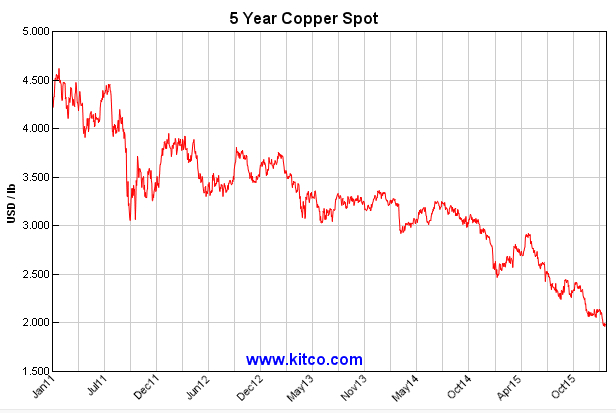Chile losing ground as top copper producer since metal price in the pits
Not even Chuquicamata, the world's largest open pit copper mine, seems to be able to rescue Chile at the moment. (Courtesy of Codelco via Flickr)
Resilience in the copper industry, its producers and investors, continues to be tested this year, as the metal price has touched fresh lows, falling last week to $1.95 per pound, a price last seen in May 2009, and analysts don't see a clear end to China's slowdown.
Last week, Chile's state copper commission Cochilco cut again average copper prices for the year to $2.15 and $2.20 per pound in 2017, about 35 cents less than what it predicted in September.
At those prices, companies will likely reduce copper output, said the group. For this year, Cochilco expects an increase in production of only 0.1% more than 2015, which reached 5.76 million tonnes, but for 2017 it expects production to pick up, growing 3.1% to 5.95 million tons.
The situation is worse than many think, according to the country's mining industry group Consejo Regional Minero de Coquimbo (Corminco), which represents some of Chile's top miners in the copper sector, including Antofagasta (LON:ANTO), Glencore (LON:GLEN) and Teck Resources (TSE:TCK.A, TCK.B) (NYSE:TCK).
Its president, Juan Carlos S??ez, warned in November that a "majority" of the group's members were already unable to make a profit.
"We hope this is already the lowest level," said S??ez referring to copper prices of about $2 per pound. "Because it's below the limit of exploitation for the majority of miners in the country."


Chart by Kitco Metals.
If Chile's production continues to suffer, the country is likely to continue losing ground to competitors including Peru, China, United States, Australia and emerging markets, such as Zambia and the Democratic Republic of Congo, in Africa's Copperbelt, Cochilco says.
According the organization's figures, in 2005 Chile produced 35% of the global copper supply. In 2015, that figure fell to 30%. During those 10 years, in turn, local production rose merely 8%, while Peru's grew 37%, China's 114%, Zambia's 72% and Congo's 956%.
"Chile hasn't been able to keep the extraordinary momentum provided by the mining boom of the 90s, when a bunch of new mines began operations: Escondida, Los Pelambres, Collahuasi, to name a few," Juan Carlos Guajardo, executive director Plusmining, told local newspaper La Tercera (in Spanish).
But a tumbling copper price is not the only factor that has weighed in Chile's production slowdown. Ore grades are falling, so companies have to blast more rock out of the ground simply to stand still.
Energy supply is also a worry, since the South American nation produces virtually no fossil fuels and relies on imported coal and liquid natural gas to power its mines. Energy costs account for 18% of the cost of production.Water supply is another key issue. Farmers and communities accuse mining companies of sucking the land dry to keep their operations running. A raging seven-year drought has not helped. Miners are turning to desalination plants or using untreated seawater. But pumping water from the Pacific to the Atacama Desert, the heart of Chile's copper industry, and the Andes is difficult and expensive.Chile's environmentalist movement forced the government to tighten regulations. In 2001, it took 236 days to get an environmental impact assessment approved. By 2013, it took 506 days.And then, there is politics, as a major labour reform is currently being discussed in parliament, which would make the trade unions more powerful, which could lead to more strikes and stoppages.Chilean authorities see a recovery coming to the sector by the end of the year. For now, they are urging companies to implement strict cost control mechanisms at mines, which would help them to survive during difficult times.
